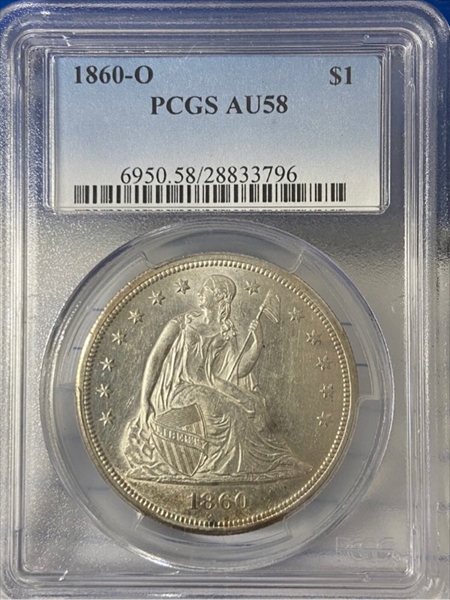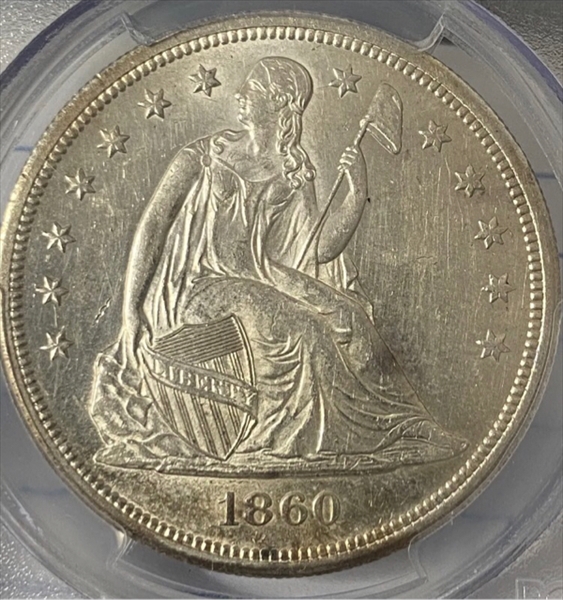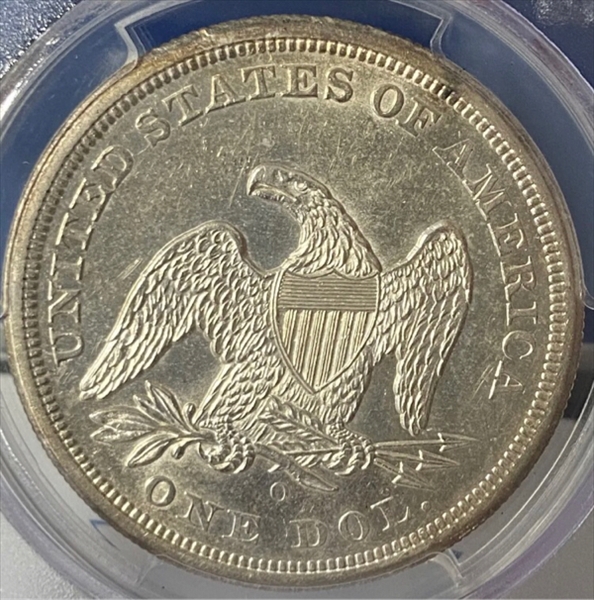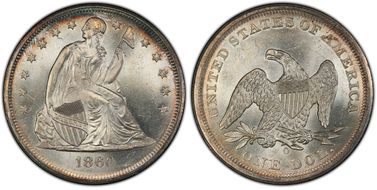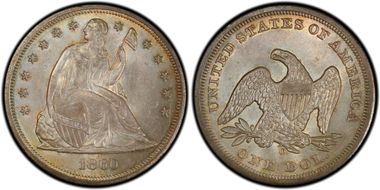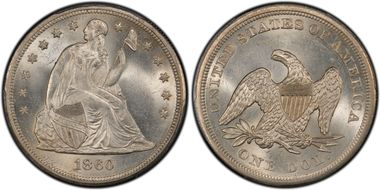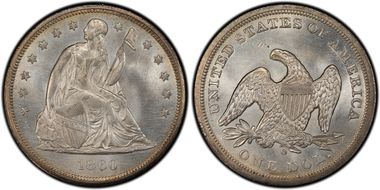1860-O $1 AU58 认证号28833796, PCGS号6950
专家评论
Q. David Bowers
The following narrative, with minor editing, is from my "Silver Dollars & Trade Dollars of the United States: A Complete Encyclopedia" (Wolfeboro, NH: Bowers and Merena Galleries, Inc., 1993).Coinage Context
Another export dollar: The 1860-O dollar was probably intended primarily for the export trade, which at the time was active through New Orleans (among other ports). Most were used in this way, although probably several tens of thousands were held domestically.
Numismatic Information
1860-O circulated grades: Examples in grades from Very Fine to About Uncirculated exist in fairly large numbers. See commentary under 1859-O for more information.
Availability of Mint State grades: It is believed by Walter H. Breen that 6,000 coins were released by the Treasury during the 1962-1964 distribution, although other opinions as to the quantity vary widely.
(Ron Severa in "Liberty Seated Dollars-Scarcity/Availability," Gobrecht Journal, March 1977, thought that just. 1,000 were released. Other estimates have ranged from 2,000 to 6,000.)
Nearly all of these coins were heavily bagmarked and today fall in the MS-60 or slightly finer category. In my opinion, the grading services have loosened their standards, for many 1859-O and 1860-O dollars that should have been graded MS-60 are found in slabs marked with slightly higher grades. Bruce Amspacher wrote this: "The average BU 1860-O dollar earned the nickname of 'Quaker Oats dollar,' because it looks like it was shot from guns." (Article, "Liberty Seated Dollars," in the Monthly Summary, Coin Dealer Newsletter, July-August, 1982.)
I have never seen an MS-64 or MS-65 coin from the Treasury hoard. When such higher graded coins come on the market they are usually from cabinets formed years earlier. See commentary under 1859-O for more information.
John W. Highfill's Comprehensive U.S. Silver Dollar Encyclopedia quotes John Love's recollection that he once had a bag of 1,000 Uncirculated pieces. In the same vein, John W. Dannreuther's commentary on a distribution was given as follows:
A bank in a small town in Arkansas wanted to give away a silver dollar as a promotion (opening a new account), so they ordered a bag of silver dollars from the New Orleans Federal Reserve. One of the Arkansas bank's officers happened to walk by one of the tellers and glanced in the cashier's drawer and said, "What are these?" The teller's response was, "Those are the dollars we are giving out in our promotion." The officer quickly stopped that promotion, but supposedly over half the bag had already been dispersed. A local customer of mine started buying them from the bank and eventually ended up with about a hundred or so of them. It is a great story and it is probably true.
Harry Forman in an interview with the author reported finding about 300 Mint State coins in a bag with about 700 1859-Os, although the "grapevine" long held that Harry had handled thousands of coins. John Love recalled handling 1,000 pieces (see above), and estimated that about 500 were distributed in Arkansas.
Dealer Steve Estes related the following: (Letter to the author, April 2, 1992.)
"A fellow by the name of Kent Oram was working in a bank in Las Vegas in 1964, and he discovered a bag of 1860-O dollars in a shipment from the Federal Reserve. He was smart enough to grab it .... From then until about 1967 he was in the coin business, and sold off the dollars."
Bruce Amspacher related this concerning 1860-O dollars released by the Treasury in the early 1960s: (Letter to the author, June 24,1992.)
When I went to coin shows in Oklahoma in the 1960s, Don Willis of Marlow, Oklahoma was always there and he always had a group of 1860-O dollars for sale. He even sold one for a huge price-$85. "It is really a nice one," he said, almost apologetically. I asked him about the coins at the June 1992 Long Beach show. He said that he and his then partner, Albert Stone, had purchased about 10 rolls in Arkansas in the late 1960s. Then, each year for the next several years, they bought 20 or 30 more coins each time they went to a certain pawnshop in Fort Smith. There was supposed to have been an "original bag" that broke there plus some rolls of 1859-O dollars that were found in a bag of Morgans. All of the coins were Uncirculated; most were heavily bagmarked.
My own experience is that 1860-O dollars were more often seen than 1859-Os in the 1960s. I believe that 1860-O is considerably the more plentiful of the two. PCGS data suggest that about 60 Mint State 1859-O dollars have been certified for every 100 1860-Os.
My estimate is that as it is fairly certain that 3,000 or more 1859-O dollars were released (see 1859-O above), and that the proportion of Mint State 1859-O to 1860-O today seems to be about 6 to 10, at least 5,000 1860-O dollars were released.
Varieties
Circulation strikes:
1. Heavy Numerals: Breen-5464. Obverse: With heavy numerals in the date. Among those with "heavy" obverse numerals are found examples from a hoard believed to have been six bags of 1,000 coins each, or 6,000 coins totally, released by the Treasury Department in 1962-1964.
2. Light (or "thin") Numerals: Breen-5465. Obverse with light numerals in the date, from the logo-type not being punched deeply in the die. Reverse with heavy O mintmark.
3. Light (or "thin") Numerals: Breen-5466. Obverse with light numerals in the date. Reverse with light 0 mintmark.
Dies prepared: Obverse: Unknown; Reverse: Unknown
Circulation strike mintage: 515,000
Estimated quantity melted: Unknown
Characteristics of striking: Usually fairly well struck. Satiny rather than deeply frosty lustre; fields usually prooflike, especially on non-hoard coins.
Known hoards of Mint State coins: An estimated 6,000 Mint State coins plus an unknown quantity of worn coins were in the Treasury release of 1962-1964; nearly all of the Mint State pieces are heavily bagmarked.
Commentary
The 1860-O is the most plentiful Liberty Seated dollar in Mint State, due to the availability of hoard coins.
Additional Information
Mint Sources of Silver
A retrospective commentary in the Annual Report of the Director of the Mint, 1867 (sic), noted, that the fiscal year ended June 30, 1860 represented the first time that Nevada silver had been deposited in any of the United States mints, during which year $102,540.57 worth was paid in. Much must have come from the Comstock Lode.
Prior to this, the main source of domestic silver had been in parting the metal from gold, rather than from specific silver deposits. It was not until fiscal year 1858 that silver deposits on their own came from elsewhere, during which year $15,623 was deposited in the mints from the Lake Superior district, followed in 1859 by $30,122.13 from the same source. 1859 also saw the first deposits of silver from North Carolina, amounting to $23,398.
1860, the first year of the Nevada silver deposit, was also the first year of deposit of silver from Arizona, ($135,357) and New Mexico ($1,200). This does not include silver parted from gold in any of these regions.
PCGS #
6950
设计师
Christian Gobrecht
边缘
Reeded
直径
38.10 毫米
重量
26.73 克
铸币数量
515000
金属成分
90% Silver, 10% Copper
更高评级数量
882
评级较低的钱币数量
903
地区
The United States of America
价格指南
PCGS 数量报告
拍卖 - PCGS 评级的
拍卖 - NGC 评级的
稀有性和存量估计 了解更多
| 所有评级 | 10000 |
| 60或以上 | 1200 |
| 65或以上 | 15 |
| 所有评级 | R-3.0 |
| 60或以上 | R-4.9 |
| 65或以上 | R-9.3 |
| 所有评级 | 30 / 30 |
| 60或以上 | 30 / 30 |
| 65或以上 | 20 / 30 |
| 所有评级 | 44 / 45 |
| 60或以上 | 44 / 45 |
| 65或以上 | 30 / 45 |




















